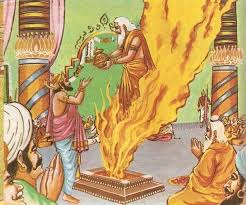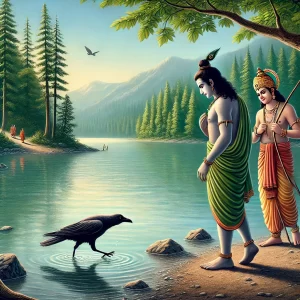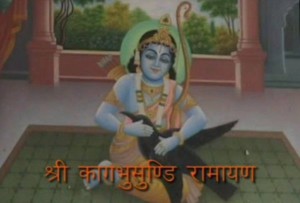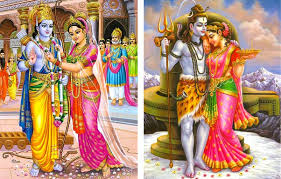The Dilemma of Dasarath Maharaj:
In the grand city of Ayodhya, within the kingdom of Koushal, there ruled a noble king named Dasarath Maharaj. Though he had 350 wives, with three being most prominent—Kausalya, Kaikeyi, and Sumitra—he was troubled by the absence of a son despite years of effort. Dasarath Maharaj belonged to the esteemed lineage of the great King Ikshvaku, part of the illustrious Solar Dynasty. This lineage was one of two sacred dynastic successions in the Kshatriya race, the other being the Lunar Dynasty. For such a revered and God-conscious king, it was considered a sacred duty to have a son who could succeed him and lead the kingdom with the highest principles of Krishna Consciousness.
Dasarath Maharaj, despite his vast empire, unchallenged sovereignty, and a prosperous, obedient kingdom, felt that his life was incomplete and empty without a son to continue his legacy. He confided in his ministers and the sages of his court about his despair. They advised him to perform a yagna (sacrifice) as a means to fulfill his desire for progeny. One of the ministers reminded Dasarath that long ago, the sages Sanat Kumara and others had foretold that he would have a daughter, which he did, named Santa. Santa had been given to King Romapad, a friend of Dasarath, who had no children. Santa later married a great sage named Rishyashrunga, who was a Brahman.
The Sacred Yagna and Lord Vishnu’s Blessing:
Rishyashrunga, being a pure and powerful Brahman from birth, was called upon to perform the yagna. The yagna was conducted with great devotion, and various demigods, including Lord Brahma himself, came to accept the offerings made during the ceremony. During the yagna, Dasarath Maharaj prayed fervently for a son to continue his service to the world. Simultaneously, the demigods, troubled by the malevolent demon Ravana, prayed to Brahma for a savior. Ravana, empowered by boons granted by Brahma, had become invincible and terrorized the universe, causing immense suffering.
At this crucial moment, Lord Vishnu appeared in the sacrificial arena, riding on His divine bird carrier, Garuda. He announced to all present that He would soon incarnate as the son of Maharaj Dasarath. Lord Vishnu assured them that He would slay Ravana and restore peace and glory to the world.
Lessons to Be Learned
- The Importance of Faith and Perseverance:
- Despite his despair, Dasarath Maharaj did not lose hope. His faith in the guidance of sages and his perseverance in performing the yagna led to the fulfillment of his deepest desire.
- The Role of Divine Intervention:
- When faced with insurmountable challenges, like the threat of Ravana, the demigods turned to the Supreme Lord for help. This teaches us that in times of great need, we should seek divine intervention and trust in the Lord’s plan.
- The Sacred Duty of Rulers:
- The story emphasizes the sacred duty of Kshatriya kings to ensure the welfare of their kingdom and to continue their lineage in accordance with divine principles.
- The Power of Yagna (Sacrifice):
- The yagna performed by Dasarath Maharaj was not merely a ritual but a profound act of devotion that invoked the presence and blessings of the Supreme Lord, demonstrating the power of sincere prayer and sacrifice.
Prayer
O Supreme Lord Vishnu, the protector of the universe, We bow before You, seeking Your guidance and blessings.
May we, like Dasarath Maharaj, have unwavering faith in Your divine plan, Even when faced with the greatest challenges.
O Lord, please grant us the wisdom to perform our duties with devotion, And to seek Your presence in all aspects of our lives.
Hare Krishna, Hare Krishna, Krishna Krishna, Hare Hare, Hare Rama, Hare Rama, Rama Rama, Hare Hare.



